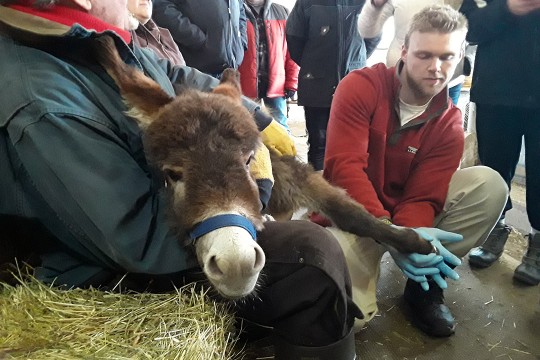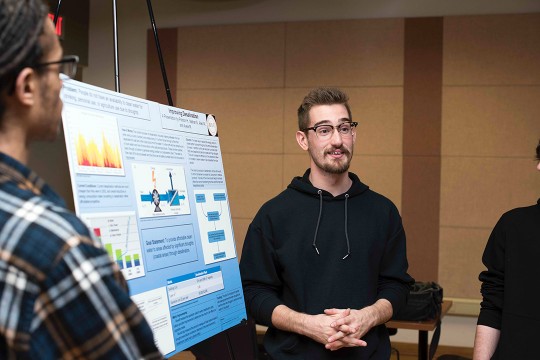News
Department of Biomedical Engineering
-
February 3, 2021

Steven Day awarded 406K from NIH
Steven Day, head and professor in Biomedical Engineering, receives an award to develop a silicon membrane device for newborns that will treat life-threatening lung problems. The device aims to reduce problems associated with current devices to minimize bleeding and clotting risks.
-
November 11, 2020

Three new engineering doctoral programs expected to start next fall
Three new engineering doctoral degree programs at RIT were approved by the New York State Department of Education and are focused on using multidisciplinary approaches to solving today’s global challenges.
-
September 16, 2020

Steven Day awarded 337K from NIH & Drexel University
Steven Day, a professor in Biomedical Engineering, received 337K from the National Institutes of Health, in collaboration with Drexel University to research ventricular assist devices (VADs) for high-risk pediatric patients in outpatient settings.
-
July 16, 2020

Researchers develop new method to filter extracellular vesicles to improve diagnostics options
Researchers at RIT and the University of Rochester discovered an alternative to successfully purify biological particles to better understand how cells communicate with one another.
-
April 20, 2020

RIT Rallies: Alumnae contributed to antibody test recently launched by Ortho Clinical Diagnostics
Maria Romero-Creel ’17 (biomedical engineering) and Wendy Salamone ’10 (biotechnology) are just two of the people responsible for the analyzer database update launched by Ortho Clinical Diagnostics on April 14. The team is responsible for ensuring that calibrations, precision fluid information and analyzer settings for new assays like COVID-19 are properly entered and working for analyzers in the field.
-
April 15, 2020

RIT researchers build micro-device to detect bacteria, viruses
Ke Du and Blanca Lapizco-Encinas, both faculty-researchers in RIT’s Kate Gleason College of Engineering, worked with an international team to collaborate on the design of a next-generation miniature lab device that uses magnetic nano-beads to isolate minute bacterial particles that cause diseases. This new technology improves how clinicians isolate drug-resistant strains of bacterial infections and difficult-to-detect micro-particles such as those making up Ebola and coronaviruses.
-
February 20, 2020

Saler’s new 3D-printed shoes
Saler, a miniature donkey, received new, 3D-printed shoes this past weekend at Karen and Bob Pinkney’s Wychmere Farms in Ontario, N.Y. RIT biomedical engineering students were among the unlikely team brought together to help the 9-month-old little donkey whose tendons did not develop properly in his front legs.
-
February 10, 2020

In Focus: Biomedical engineering students help advance digital microscope technology
Biomedical engineering students Brandon Buscaglia and Marcus D’Aguiar are helping physicians see the invisible. The undergraduates developed a motorized stage and tracking prototype that works in conjunction with digital microscopes. The students’ ideas are being incorporated into a company’s tech offerings today, providing the potential to make an impact in health care applications tomorrow.
-
December 15, 2019

Students address challenges in RIT Grand Challenges Scholars Program
Ridding waterways of microplastics, delivering water to remote villages experiencing drought, and better ways to remove salt from water were just a few of the clean-water research projects recently presented by undergraduate students as part of RIT’s Grand Challenge Scholars program.
-
August 23, 2019

RIT professor named to IAspire Leadership Academy
Blanca Lapizco-Encinas, professor of biomedical engineering in RIT’s Kate Gleason College of Engineering, was named a Fellow in the inaugural cohort of the I Aspire Leadership Academy. This leadership program aims to help STEM faculty from underrepresented backgrounds attain leadership roles at colleges and universities.
-
July 24, 2019

Kate Gleason College of Engineering recognized for diversity and inclusion initiatives
Engineers today must be able to manage technical aspects of projects but also work effectively in a diverse, multi-cultural workplace. RIT is preparing its engineering graduates for those growing demands and was recognized by the American Society of Engineering Education as part of its national commitment to improve diversity within university engineering programs.
-
June 24, 2019

Infrared imaging technology being developed to better detect breast cancer
Faculty and student researchers at RIT, and physicians from the Rochester Regional Health System (RRHS), developed a non-invasive process using infrared imaging to better detect cancerous tumors.


